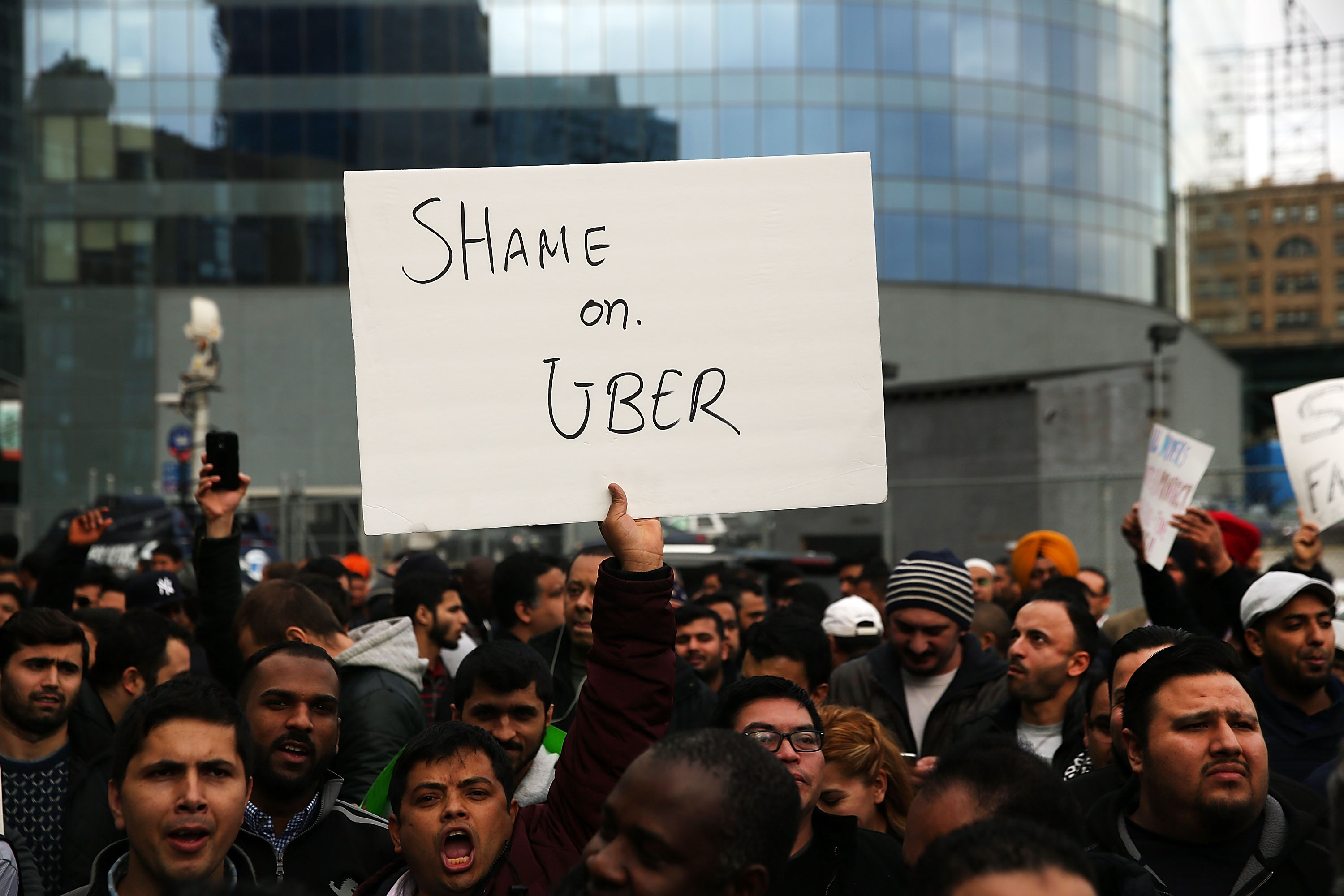Uber's pile-up of disasters
"Uber was already off to a bad start in 2017, but the year is getting worse by the day."

A free daily email with the biggest news stories of the day – and the best features from TheWeek.com
You are now subscribed
Your newsletter sign-up was successful
The smartest insight and analysis, from all perspectives, rounded up from around the web:
"Uber was already off to a bad start in 2017, but the year is getting worse by the day for the $69 billion ride-hailing company," said Biz Carson at Business Insider. After losing more than 200,000 users in January to the #DeleteUber movement, which formed in response to allegations that the company tried to profit from a travel ban protest, Uber "has been pummeled by a seemingly never-ending barrage of bad news." This week, Uber briefly halted its self-driving car tests after a crash in Arizona, and it had to address a report about its executives going to an escort-karaoke bar in Seoul, even as it struggled to contain the damage from recent allegations of widespread sexual harassment. Then there's the lawsuit from Google accusing Uber of stealing self-driving car technology; revelations that Uber used secret technology to evade local regulators; and a viral video of CEO Travis Kalanick insulting a driver. "If business schools need a new case study for a company in a PR disaster, Uber's last month is as perfect an example as can be found."
Uber's pain is Lyft's gain, said Katy Steinmetz at Time. Uber's ride-hailing rival has grabbed about 5 percent of Uber's market share since the #DeleteUber campaign launched, and has been aggressively positioning itself as a feel-good alternative. Lyft also scored positive attention with a $1 million donation to the American Civil Liberties Union after President Trump issued his first travel ban, and this week it unveiled a new feature that lets users donate part of their fare to charity. But with just 20 percent of the market to Uber's nearly 80 percent, "Lyft is still a pretty distant No. 2." Uber's mess is a big distraction for the company, but overall, "it hasn't bothered riders and it hasn't hurt business," said Erin Griffith at Fortune. Case in point: Uber just reported its best week ever for sales in the U.S. Lyft is currently trying to recruit new investors, but it remains to be seen whether "Check out our competitor's dumpster fire!" is a convincing sales pitch.
The Week
Escape your echo chamber. Get the facts behind the news, plus analysis from multiple perspectives.

Sign up for The Week's Free Newsletters
From our morning news briefing to a weekly Good News Newsletter, get the best of The Week delivered directly to your inbox.
From our morning news briefing to a weekly Good News Newsletter, get the best of The Week delivered directly to your inbox.
Is this is the sound of the tech bubble popping? asked Adrienne LaFrance at The Atlantic. Uber is by far the most valuable of the 187 "unicorn" startups valued at $1 billion or more, despite losing at least $1.2 billion in the first half of 2016. But it's unlikely an Uber collapse "would set off too terrible of a chain reaction in Silicon Valley." The tech industry's funding sources are more diversified than they were in the original dot-com bubble, and the definition of what makes a "technology company" is also much broader. Odds are, investors will see Uber's flaws as an isolated case of bad corporate governance, not evidence that they shouldn't be investing in startups. The era of cheap, investor-subsidized Uber rides may be over, however, said Alison Griswold and Akshat Rathi at Quartz. At its present pace, Uber will "exhaust its current financing in a little more than two years." The company can hardly afford to alienate drivers further by cutting into their take, so it will probably raise fares instead. "If nothing else, don't expect rides to ever get any cheaper."
A free daily email with the biggest news stories of the day – and the best features from TheWeek.com
-
 6 of the world’s most accessible destinations
6 of the world’s most accessible destinationsThe Week Recommends Experience all of Berlin, Singapore and Sydney
-
 How the FCC’s ‘equal time’ rule works
How the FCC’s ‘equal time’ rule worksIn the Spotlight The law is at the heart of the Colbert-CBS conflict
-
 What is the endgame in the DHS shutdown?
What is the endgame in the DHS shutdown?Today’s Big Question Democrats want to rein in ICE’s immigration crackdown
-
 The pros and cons of noncompete agreements
The pros and cons of noncompete agreementsThe Explainer The FTC wants to ban companies from binding their employees with noncompete agreements. Who would this benefit, and who would it hurt?
-
 What experts are saying about the economy's surprise contraction
What experts are saying about the economy's surprise contractionThe Explainer The sharpest opinions on the debate from around the web
-
 The death of cities was greatly exaggerated
The death of cities was greatly exaggeratedThe Explainer Why the pandemic predictions about urban flight were wrong
-
 The housing crisis is here
The housing crisis is hereThe Explainer As the pandemic takes its toll, renters face eviction even as buyers are bidding higher
-
 How to be an ally to marginalized coworkers
How to be an ally to marginalized coworkersThe Explainer Show up for your colleagues by showing that you see them and their struggles
-
 What the stock market knows
What the stock market knowsThe Explainer Publicly traded companies are going to wallop small businesses
-
 Can the government save small businesses?
Can the government save small businesses?The Explainer Many are fighting for a fair share of the coronavirus rescue package
-
 How the oil crash could turn into a much bigger economic shock
How the oil crash could turn into a much bigger economic shockThe Explainer This could be a huge problem for the entire economy